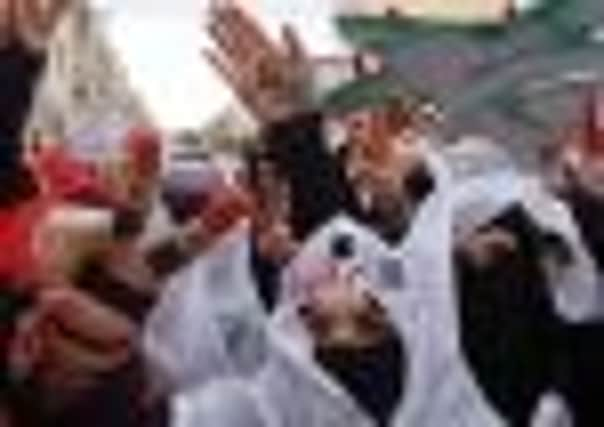Assad regains rebel-held Rastan


Rami Abdel-Rahman, head of the Syrian Observatory for Human Rights, said the Syrian army had occupied around 80 per cent of the town after a force of 250 tanks was sent to the Rastan region on Friday.
He said communication with Rastan, a town of 40,000 people which lies 110 miles north of Damascus, was difficult, but a resident who managed to escape early yesterday reported heavy gunfire through the night.
Advertisement
Hide AdAdvertisement
Hide AdRastan has seen the first prolonged armed confrontation between rebels and soldiers loyal to President Bashar al-Assad, who is battling a six-month uprising.
The United Nations says 2,700 people have been killed in Assad’s crackdown on the unrest. Syria blames the violence on armed gangs backed by foreign forces, and says 700 police and soldiers have been killed.
On Friday, Syrian troops fought intense battles with hundreds of fellow soldiers who have turned their weapons against the Assad regime, revealing the increasingly militarised nature of an uprising started months ago by peaceful protesters.
Also on Friday, tens of thousands of demonstrators took to the streets across the country as they do each week after Friday prayers, braving gunfire by government forces who have waged a relentless crackdown. At least 11 protesters were killed and scores were wounded.
The army defections, as well as reports that once-peaceful protesters are increasingly taking up arms to resist the government crackdown, have raised concerns of the risk of civil war in a country with a deep sectarian divide.
Around 250 tanks and other army vehicles began entering the town of Rastan early in the day. “The army has been trying to push forward in Rastan for the past four days but they have not been able to,” said an activist.
The Syrian government has banned foreign journalists and placed heavy restrictions on local media coverage, making it difficult to independently verify events on the ground.
However, the United Nations says some 2,700 people have already died in the government crackdown since mid-March.
Advertisement
Hide AdAdvertisement
Hide AdThe army defectors involved in battles in the Rastan area and in the Jabal al-Zawiyah region in the northern Idlib province number around 2,000, according to another prominent rights activist who also spoke anonymously because of the sensitivity of the matter.
Syria has a volatile sectarian divide, making this kind of civil unrest one of the most dire scenarios. The Assad regime is dominated by the Alawite minority, an offshoot of Shiite Islam, but the country is overwhelmingly Sunni Muslim.
The town of Rastan, from which the Syrian army draws many of its Sunni Muslim recruits, has seen some of the largest numbers of defections to date.
Syria-based rights activist Mustafa Osso said Rastan had witnessed more defections in recent days and the deserters were fighting to prevent troops loyal to Assad from entering the town.
Hundreds of Rastan’s residents came out for demonstrations held in support of the defectors.
A military official said the days of clashes in Rastan have killed seven soldiers and policemen as government forces conducted a “qualitative” operation on Thursday and Friday in an effort to crush “gunmen” holed up inside the town. Thirty-two other troops were wounded, the official said.
The comments by the unidentified official were carried by state-run news agency SANA on Friday and were a government acknowledgment of the stiff resistance in Rastan. Many gunmen were also killed or arrested, the official said.
The government describes its armed opponents as “terrorist armed groups”, not army defectors. The official said the gunmen had terrorised citizens, blocked roads and set up barriers and explosives.
Advertisement
Hide AdAdvertisement
Hide AdFriday’s protests spread from the capital, Damascus, and its suburbs to the southern province of Daraa, the coastal city of Latakia, the north-western province of Idlib as well as Hama and Homs.
Eleven people were killed, according to the London-based Observatory and Osso, the activist. Most of the dead were from the province of Hama. Others were killed in Homs and Idlib, they said.
They had no immediate word on Friday’s death toll in Rastan because of the intensity of the fighting.
Amateur videos posted online by activists showed thousands of people shouting in support of Rastan. In the Damascus neighbourhood of Hajar Aswad, hundreds chanted “Rastan is the castle of defiance.”
“Rastan will overthrow the regime,” read one banner waved by protesters in the Damascus neighbourhood of Qadam. Many of the protesters there covered their faces with scarves or masks to hide their identities.
Meanwhile on Friday, European nations dropped an explicit threat of sanctions against the Syrian regime of Assad to try to win Russian support for what would be the first UN resolution condemning his military crackdown on civilian protesters.
The Europeans also appealed to all sides in Syria “to reject violence and extremism”.
The new European draft resolution still threatens to consider imposing “targeted measures”, which can include sanctions, against Syria if it does not comply with demands, including an immediate halt to violence and respect for human rights.
Advertisement
Hide AdAdvertisement
Hide AdBut the words “including sanctions”, which were in the previous draft, are gone.
Russia’s UN ambassador Vitaly Churkin said after a closed UN Security Council meeting on Thursday that Moscow was totally opposed to even mentioning the possibility of sanctions “and we are not the only ones ... who think that”.
Asked about the latest draft, Churkin said: “The important thing is that our capitals are looking at it.”
Whether Russia will support, oppose or abstain on the resolution remains to be seen. Several western diplomats said they hoped for a council vote on Tuesday.
It took four months for the security council to break a deadlock between supporters and opponents of Syria and finally issue a statement in August condemning the escalating violence in the country. But the UN’s most powerful body has been unable to agree on a legally binding resolution.